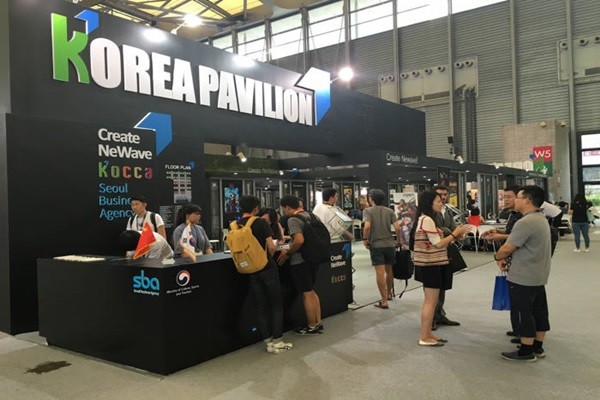China’s biggest game show called ChinaJoy is going to allow the name ‘Korea Pavilion’ this year. It will be interesting to see whether this decision will ease Chinese Government’s sanctions that disallow distribution of South Korean games within Chinese market as a result. These sanctions have been put in place since a year ago due to placement of THAAD (Terminal High Altitude Area Defense).
According to Korea Creative Content Agency (KOCCA), Korea Pavilion will enter ChinaJoy exhibition that will be held in Shanghai in August.
“Organizers of ChinaJoy recently accepted our proposal of using the name ‘Korea Pavilion’.” said Department Head Kang Kyung-seok of KOCCA’s Game Headquarters. “Although there may be variables since there is some time until ChinaJoy 2018, we will be able to introduce contents of small and medium South Korean game developers under the name ‘Korea Pavilion’.”
Although KOCCA set up the biggest pavilion at ChinaJoy 2017’s B2B Exhibition Room, it put up an ambiguous name called ‘KOCCA Pavilion’ because organizers of ChinaJoy did not allow KOCCA to exhibit products under names such as ‘Korea’ or ‘Hangook’. Atmosphere of ChinaJoy 2017 represented relationship between South Korean Government and Chinese Government. Since middle of 2000s, KOCCA have supported small and medium South Korean companies with exporting their products to Chinese market by setting up Korea Pavilion at ChinaJoy. Before ChinaJoy disallowed use of the name ‘Korea Pavilion’, State Administration of Radio and Television of the People’s Republic of China that is responsible for distribution of contents within China did not allow distribution of South Korean games within Chinese market since March of 2017.

Although popular South Korean mobile and online games such as ‘Lineage II Revolution’, ‘Black Desert’, and ‘Battlegrounds’ were released since March of 2017, they have yet to be distributed within Chinese market. All of the games are based on genres such as RPG and shooting that will be popular within Chinese market. However, relevant businesses have lost business opportunities by not being able to distribute them within Chinese market.
South Korean Government is expecting that there is a chance that the sanction may be lifted at the end of this year. “Along with organizations that work with Chinese Government, we are continuing to make contacts with organizations that are responsible for allowing distribution of contents within Chinese market.” said a representative for South Korean Government. “We believe that there will be an opportunity at the end of this year that may solve this problem.” It is heard that South Korean Government notified Chinese Government about its position towards Chinese’s sanction on South Korean games through an unofficial way at a summit between South Korea and China that was held in China at the end of last year.
South Korean Government is expecting that Chinese Government will not be able to maintain this sanction since it is an unofficial sanction and that it will be difficult for Chinese Government to ignore requests from Chinese businesses such as Tencent and others that are supposed to import South Korean games.
China is the country that imports South Korean games the most. According to 2017 White Paper on Korean Games, Chinese region (China, Hong Kong, and Taiwan) was responsible for 36.4% of exports of South Korean games in 2016. Most of games that were exported were online games such as ‘Dungeon & Fighter’ and ‘Crossfire’ that entered Chinese market during the later end of 2000s.
Staff Reporter Kim, Siso | siso@etnews.com